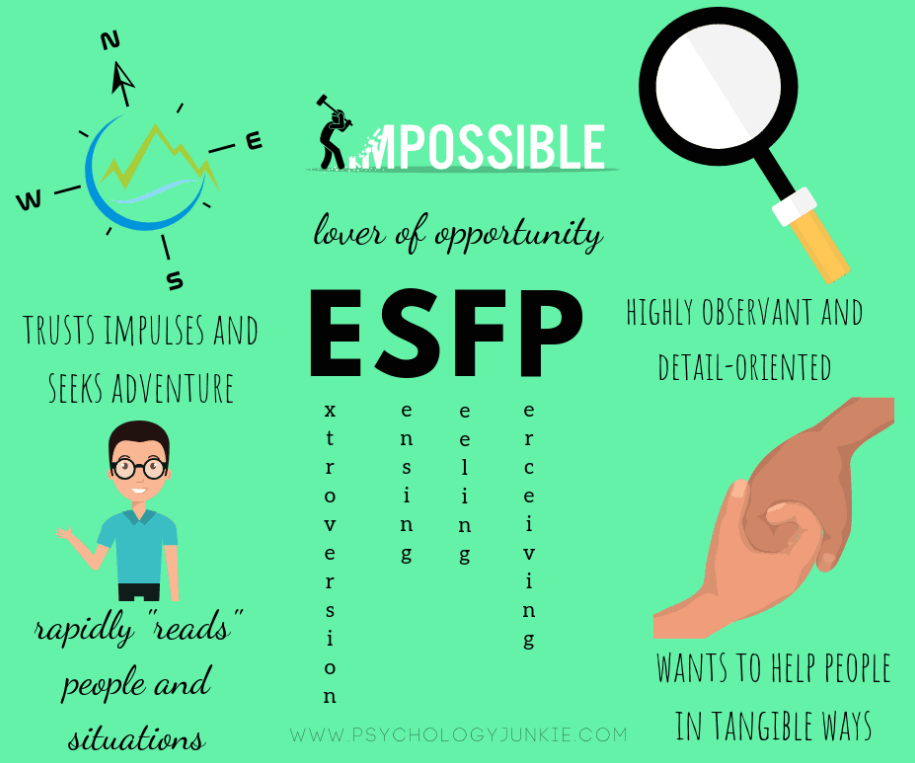Personality types and the Myers-Briggs personality test are often talked about in the realm of dating. And it’s easy to see why. Personality tests assess an individual’s behavior, social dynamics, and psyche—all key factors in determining compatibility between two people.
But personality types have other applications too. In the same way that your personality type can shed light on what kind of person you’re compatible with, your personality type can also be a great way of considering the kinds of careers that best suit your temperament.
One of the most common personality types is ESFP, which stands for extraverted, sensing, feeling, and perceiving. And like other personality types, ESFPs tend to excel in certain roles. Want to learn more about the kinds of careers that are great for an ESFP? Then keep reading. Below, we’ll tell you all about ESFP personalities and what careers they’re best suited for.
What Does It Mean To Have an ESFP Personality?

ESFP is a personality type based on the Myers-Briggs test. It stands for:
- Extraverted (you find being around other people rejuvenating rather than draining)
- Sensing (you focus on details rather than abstract ideas)
- Feeling (you make decisions based on your values)
- Perceiving (you prefer flexibility and spontaneity over having a plan)
What Type of Roles Do ESFP Personalities Shine In?
ESFPs quickly adapt to roles that are physically challenging or have an element of adventure or risk. ESFP personalities also enjoy people-centric roles where their strong social skills can shine. They also tend to be comfortable in data-related roles because of their eye for detail and appetite for information.
What Careers Are Best for ESFP Personalities?
ESFPs don’t work well isolated in a cubicle, doing the same thing day after day. Some common jobs for ESFP personality types include:
Digital Marketer
Digital marketers talk to customers, understand their needs, and discover what makes them happy. In other words, it’s everything that an ESFP shines at.
Job Role and Responsibilities
A day in the life of a digital marketer includes conducting customer research, coordinating marketing campaigns, and staying on top of social media trends. They sometimes contribute to product development.
Prerequisites
To become a digital marketer, you’ll need strong project management skills and an understanding of major digital channels such as social media, paid ads, email, influencer marketing, etc.
What Makes This Career Suitable for ESFPs?
ESFPs tend to enjoy learning about people and helping them, which is the crux of digital marketing. ESFPs also tend to be empathetic, another key marketing trait, and detail-oriented.
Real Estate Agent/Realtor
Realtors must have excellent interpersonal skills, making this a popular career choice for ESFPs, who tend to be outgoing.
Job Role and Responsibilities
A realtor stages properties, coordinate with escrow companies and home inspectors, and conduct negotiations between sellers and buyers.
General Prerequisites
Real estate agents must have an active real estate license, an understanding of real estate, and strong networking and communication skills.
What Makes This Career Suitable for ESFPs?
ESFPs can be great realtors, as they tend to enjoy social interactions. ESFPs tend to be creative and love to express themselves, which can be reflected in how they stage properties.
Video Game Developer

Video game developers have to be creative problem-solvers. They also have to work in teams, all of which lends itself to an ESFP personality.
Job Role and Responsibilities
Video game developers perform convert design ideas into game code, produce prototypes for gameplays, and develop characters’ stories.
General Prerequisites
Video game developers must have sufficient knowledge of C# and C++, and demonstrate familiarity with AR/VR/MR, APIs, and 3D graphical handling.
What Makes This Career Suitable for ESFPs?
ESFPs tend to be expressive and love to experiment. These traits translate into creative and unique video game storyboards.
Occupational Therapist
An occupational therapist uses daily activities and movements to treat physical and mental ailments. They focus on improving patients’ mobility. It’s a holistic way of treating the entire body rather than specific injuries.
Job Role and Responsibilities
Occupational or physical therapists assess patients’ needs and conditions to create personalized treatment plans. They also examine the patients’ physical environment (home/work) to ensure the patient can follow the exercises without obstacles.
General Prerequisites
An occupational therapist must have a Master’s degree in occupational therapy and a valid OTR license. They should have strong communication skills and maintain their composure during patient interactions.
What Makes This Career Suitable for ESFPs?
ESFPs tend to love being around people, and an occupational therapist’s fundamental day-to-day requirement is to interact with patients. ESFPs also tend to be flexible—they don’t mind the new challenges of working with diverse patients. Occupational therapy also suits an ESFP personality type because they help people and can forge trusting relationships quickly, a vital skill in healthcare roles.
Sales Personnel
You’ve probably noticed a commonality in the jobs we’ve listed so far—they’re all very people-oriented. So it shouldn’t be surprising that ESFPs tend to be great salespeople, too.
Job Role and Responsibilities
Sales representatives identify prospects through cold-calling and customer surveys. Then, they prepare and deliver sales pitches and perform product demonstrations in seminars.
General Prerequisites
Hiring managers want to see that you have communication skills, including writing persuasive emails, leading prospect calls, and creating a positive rapport.
What Makes This Career Suitable for ESFPs?
Like digital marketers, sales personnel need to understand customers’ pain points. ESFPs tend to be empathetic, making them adept at this, and are also great at reading people.
Performing Artists

The performing arts—either music, drama, or dance—lends itself to ESFP personality types, too.
Job Role and Responsibilities
For performing artists, their day-to-day involves auditioning for productions, attending rehearsals, and performing live in interpretive dances, plays, or musicals.
General Prerequisites
Talent is the main prerequisite for the arts, but being able to collaborate with other actors, fellow performers, directors, and other staff is important, too.
What Makes This Career Suitable for ESFPs?
One of the biggest strengths of ESFPs is their creativity. ESFPs love having an impact on people, and art is an excellent way to do that.
Project Manager
A project manager ensures that everyone involved in a project has everything they need and that the project is delivered on time and on budget.
Job Role and Responsibilities
Project managers have to monitor team members and establish KPIs. They also have to coordinate with others to ensure that the requisite material, tools, personnel, and permissions are available.
General Prerequisites
Other than industry-specific degree/experience, project managers need excellent communication and coordination skills. They also have to be great at collaborating.
What Makes This Career Suitable for ESFPs?
ESFPs tend to be team players. They want to support everyone around them and bring the best out of them, which makes project management ideal.
Veterinarian
Veterinarians need the same skills that doctors do, but with animals rather than people.
Job Role and Responsibilities
Veterinarians treat animals and give diagnoses. They perform surgery and supervise diagnostic tests and procedures, too.
General Prerequisites
Vets must have a valid license to practice in their state.
What Makes This Career Suitable for ESFPs?
For the same reasons that ESFPs are suitable for occupational therapy, they also make great veterinarians. Vets work on animals, rather than people, but at the end of the day, they still have to deal with the owners of their clients, which entails the kind of people skills that ESFPs tend to have.
Hospitality Services

Hospitality includes lodging and accommodation, travel and tourism, event planning, and restaurant and transport services. Specific roles include receptionists, housekeeping, managers, event planners, serving staff, and travel agents.
Job Role and Responsibilities
While responsibilities differ depending on the exact role, hospitality is all about caring for others.
General Prerequisites
Anyone working in hospitality must have consummate social skills. This includes remaining composed and patient while interacting with customers, even if they’re upset.
What Makes This Career Suitable for ESFPs?
ESFPs like to be around other people, making hospitality a logical choice. And, ESFPs tend to be flexible, which is always needed when a situation emerges.
Gym Trainer / Fitness Coach
Fitness coaches and gym trainers help their clients achieve their fitness goals, either through 1-on-1 coaching or in a group setting.
Job Role and Responsibilities
Fitness trainers create fitness plans based on clients’ needs. This often includes dieting, lifestyle changes, and exercising.
General Prerequisites
Gym trainers and fitness coaches have to be knowledgeable about the human body. They also need to be able to encourage their clients to meet their goals.
What Makes This Career Suitable for ESFPs?
Fitness training is ideal for ESFPs who like to be physical. It’s also a very people-facing role, which suits ESFP personality types.
Fashion Designer
Famous fashion designers like Thierry Mugler and Olivier Rousteing are ESFP personalities, and that’s no coincidence. Fashion designers express their creativity through their designs, which perfectly suit ESFPs.
Job Role and Responsibilities
Fashion designers create prototype designs using software or by hand and present them to relevant stakeholders for approval. Then, they guide the garment through the production process.
General Prerequisites
Fashion designers need to be knowledgeable about the fashion industry and the history of fashion. They also need to work with large teams to bring their ideas to life.
What Makes This Career Suitable for ESFPs?
Fashion design is great for ESFPs, who tend to have a creative streak. Fashion design requires a keen eye when it comes to small details, making it an ideal fit for ESFPs for that reason too.
Teacher

ESFPs tend to want to have an impact, and few jobs have as much of an impact as teachers do.
Job Role and Responsibilities
Teachers craft lesson plans, teaching modules, and assignments. Then, they conduct classes, grade assignments, and work with struggling students.
General Prerequisites
Schools and educational institutions look for teachers with a bachelor’s degree in education or a license to teach in the state. They must also have excellent communication and collaboration skills.
What Makes This Career Suitable for ESFPs?
ESFPs love to serve and see the fruit of their efforts. They are empathetic, which is an ideal trait for working with students. Teaching is also a people-facing profession, making it a logical choice for ESFPs.
Graphic Designer
Graphic designers design logos, visual content, websites, and book covers.
Job Role and Responsibilities
Graphic designers collaborate with marketing teams to create visual assets for the brand at hand.
General Prerequisites
Moreso than a degree or certificate, a compelling portfolio is the main prerequisite for working as a graphic designer.
What Makes This Career Suitable for ESFPs?
ESFPs tend to have an eye for detail, which is something that graphic designers need, too. Graphic designers often have to collaborate with various teams, and so the people skills of an ESFP come in handy with this as well.
ESFP Personality Type: Strengths and Weaknesses in the Workplace

According to the Myers-Briggs Type Indicator, the ESFP personality has the following personality traits that work as strengths and weaknesses in the workplace:
ESFP Strengths
ESFPs have strong people skills and love to express themselves. ESFPs also tend to be spontaneous, which makes them adept in fast-paced work environments.
ESFP Weaknesses
ESFPs can get easily bored with downtime and monotonous days, which is part of almost any job. They also have a tendency to be impatient.
What Are Some Tips for ESFPs To Be More Successful in the Workplace?
If you’re an ESFP, then consider your weaknesses and how you can compensate for them. For example, if repetitive tasks get you down, then dole out those tasks throughout the day, rather than doing them all at once. If you tend to be impatient, then take a break when you feel yourself starting to get frustrated with your team.
ESFP Careers FAQs
We’ve got the answers to your most frequently asked questions:
Is ESFP a Rare Personality Type?
No. 9% of the population has an ESFP personality type. Of the 16 personality types, it’s the third most common among women and the seventh most common among men.
Can an ESFP Be a Good Leader?
ESFPs tend to be empathetic, which is a great leadership trait. They tend to consider multiple perspectives before making a decision, which is also useful when leading teams.
Recommended Watch: Which Resources Can Help People Looking to Become Stronger Leaders?
Are ESFPs Emotionally Intelligent?
ESFP types tend to be emotionally intelligent because they are perceptive and empathetic.
Since you’re here…
Are you a future UX designer? Enroll in our UI/UX Bootcamp and join over 10,000 students who have successfully changed careers with us. Want to get wireframing right this second? Check out our free UX design course today.



